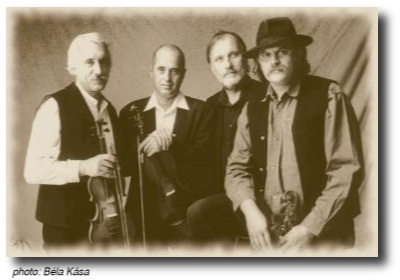
|
|
The WINNER of the WOMEX Award 2008 for World Music! After 40 years of their unrivaled career, MUZSIKÁS is the most renowned and popular Hungarian folkmusic ensemble worldwide and in their home-country as well. MUZSIKÁS pioneered the global acceptance of Hungarian folk music that is now equal with all the other styles of music. Due to their unique musical skills, instrumental knowledge and musical versatility, they can cope with playing on different music scenes, collaborating with various noted musicians and groups, from folk and world-music to classical and jazz, and even to alternative rock music (they played in live with Woven Hand in 2008). They have toured all over the world including nearly every European country, in addition to North-America, Japan, Australia and New Zealand, Hong Kong, Singapore and Taiwan. They have already presented their exceptional live performances at the greatest festivals and in the most significant concert halls, such as the Royal Festival Hall, Royal Albert Hall, Barbican Center and Queen Elisabeth Hall in London, Théatre de la Ville and Cité de la Music in Paris, Santa Cecila Academy in Rome, Concertgebouw in Amsterdam, and Carnegie Hall in New York.
|
Released
records:
| Living Hungarian Folk Music I. MUZSIKÁS (CD) |
Hungaroton Gong
|
Muzsikás Kettő (CD)
|
Munich Records
|
It is not like it used to be (CD)
|
Hungaroton Gong
|
Márta Sebestyén and Muzsikás (CD)
|
Hannibal/Ryko
|
The Prisoners' Song (CD)
|
Hannibal/Ryko
|
Blues for Transylvania (CD)
|
Hannibal/Ryko
|
Maramaros, the lost Jewish music of Transylvania (CD)
|
Hannibal/Ryko
|
Morning Star (CD)
|
Hannibal/Ryko
|
The Bartók Album (CD)
|
Hannibal/Ryko
|
|
Live at Liszt Academy (CD)
|
Muzsikás
|
Csordapásztorok (Maxi CD)
|
Kaláka
|
Fly Bird, Fly (Double CD)
|
Nascente
| |
Released DVD-s:
| CLIP Muzsikas/Danubia Orchestra/Sebestyen (DVD) |
Warner Music
|
Allegro Barbaro (DVD)
|
Muzsikas
| |
The musicians:
Mihály Sipos - violin, citera
László Porteleki - violin, koboz, vocal
Péter Éri - kontra, viola, mandolin, flute, long flute
Dániel Hamar- contrabass, gardon, drum, cymbal
Guests, partners:
András Schiff- piano
Mária Petrás- traditional singer
Alexander Balanescu- violin
Jenő Jandó - piano
György Muszka and Ilonka Muszka - traditional dance from Transylvania
Takács Quartet - string quartet
Roel Dieltiens - cello
Bartók Quartet - string quartet
Zoltán Farkas - choreograph, dance, percussion
Ildikó Tóth- choreographs, dance
Previous other partner musicians, ensembles:
Márta Sebestyén - vocal
BBC Scottish Symphonic Orchestra, conductor: Ilan Volkov
Danubia Symphonic Orchestra, conductor: Domonkos Héja
Tomkins Chamber Choir, conductor: János Dobra
Pro Musica Girls' Choir, conductor: Dénes Szabó
The Balanescu Quartet - quartet
Keller Quartet - quartet
Árpád Toni - traditional cimbalom from Transylvania
Click here to contact our agents for booking
Artist
contact:
Dániel Hamar
Kerékgyártó
u. 7/b
Budapest, Hungary, H-1147
Tel: +361.363.6742
Fax:
+361.372.2927
mobile: +36.30.933.7674
